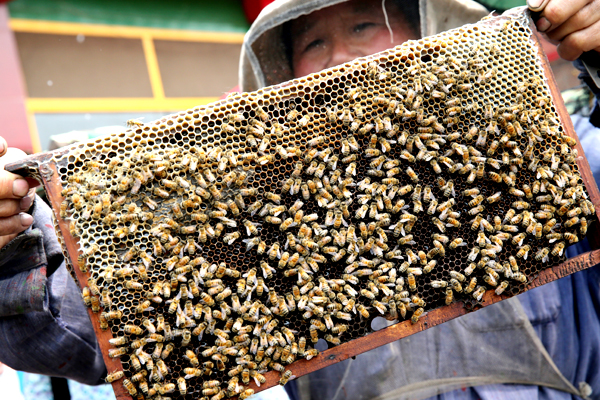Honey, it's all organic
Updated: 2013-10-24 10:47
By Sun Ye (China Daily)
|
||||||||
 |
|
Song holds up the honey board with bees. [Photo by Jiang Dong/China Daily] |
Although Song worked as a welder, he learned beekeeping from his father with whom he would gather honey every season. He helped his father every year until he retired, when he decided to keep hives full time.
"Beekeeping gives me an income that is slightly more than my former wage, so I do it mostly for interest."
Working with bees has another, more attractive perk.
"I don't catch cold easily," he says. Although he does not eat a lot of honey, the occasional licking of sticky fingers gives him enough of the good stuff to stay healthy.
"I like doing what I do, but too few young people are involved in the trade," Song says. His daughter, Song Dan, works in downtown Beijing and helps her father with sales and publicity, mainly through the micro-blogging community and regular stands at the Beijing Country Fair every weekend. His son-in-law helps out as well.
When Song is not in the mountains with his bees, he tends the hives at his Song Family Bee Garden in southeastern Beijing. He tells visitors to put on the veiled hats he supplies but he doesn't need one himself.
"If you know the bees well enough, there is no danger at all."
Song doesn't just keep bees for their honey, he has a true affection for the tiny insects. In winter, he uses a stethoscope to listen to the activity within each dormant hive, and adjust the heat and feed accordingly.
This is also the only season he gets a break from the cycle of extracting honey, pollen and royal jelly.
"Very few other bee raisers keep the bees alive through the winter, but I do." It's the same reason he takes less honey from his hives than others do. That's why it breaks his heart when tragedy strikes.
Once, on the farm, his bees discovered a flowering orchard of apricot trees nearby. They returned laden with honey and pollen but the next morning, Song was alarmed by the silence from his hives. His bees had all died, killed by the pesticides sprayed on the flowering trees.
Song now keeps his hives far away from fruit orchards and he sells honey with nectar collected from the spring meadows, the wild pagoda or scholar trees and the caragana shrubs in Miyun.
"His honey is fragrant, sweeter and denser than what I get elsewhere," says Rosie Zhang, a satisfied customer who posted on the Songs' online shop at Taobao. Their honey is not cheap, retailing for 100 yuan ($16) per kilo, but customers keep coming back.
This year, Song is happy with his harvests and his gathered honey will last until May next year when the flowers start blooming and his bees can start working again. "I don't know where this business will go but I'll go where my bees lead me."

 Post-baby Duchess
Post-baby Duchess
 Victoria Beckham S/S 2014 presented during NYFW
Victoria Beckham S/S 2014 presented during NYFW
 'Despicable' minions upset Depp's 'Lone Ranger' at box office
'Despicable' minions upset Depp's 'Lone Ranger' at box office
 'Taken 2' grabs movie box office crown
'Taken 2' grabs movie box office crown
 Rihanna's 'Diamonds' tops UK pop chart
Rihanna's 'Diamonds' tops UK pop chart
 Fans get look at vintage Rolling Stones
Fans get look at vintage Rolling Stones
 Celebrities attend Power of Women event
Celebrities attend Power of Women event
 Ang Lee breaks 'every rule' to make unlikely new Life of Pi film
Ang Lee breaks 'every rule' to make unlikely new Life of Pi film
Most Viewed
Editor's Picks

|

|

|

|

|

|
Today's Top News
US, China broadband companies join forces
Chinatown restaurants learn how to get an 'A'
Snuff bottle 'gems' on display at Met
Beijing airport set to become world's busiest
US firms urge easier process for investment
EU to hold talks with US over spying
Wal-Mart plans to open 110 new stores
China calls for strengthened EU ties
US Weekly

|

|







